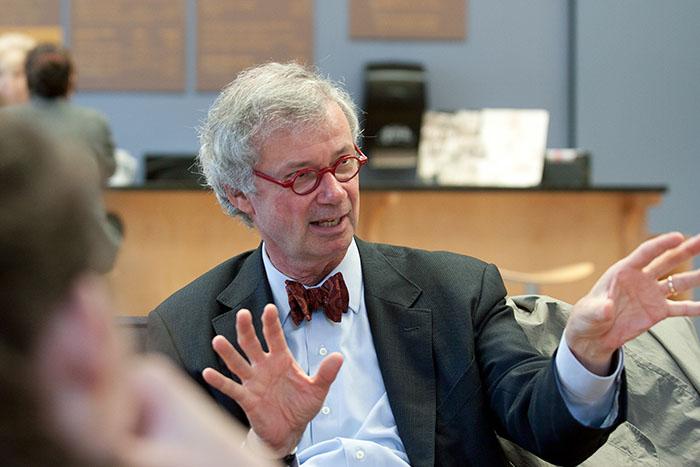Engage Everyone

From These Grounds
Some within the academy might consider an issue of Dickinson Magazine highlighting popular culture and celebrity to be trivial and wasteful. Yet, is not a healthy and broad-based intellectual curiosity encompassed in a useful liberal education? My position is enforced strongly by Dickinson's founder, Benjamin Rush, who, in a letter to a young man preparing to study medicine abroad, urged him to seek the company not just of the intellectually serious but also the wisdom of all the characters within society, including the cobbler and street sweeper.
As a Dickinsonian, I have taken such advice to heart. My life of "indiscriminate, yet disciplined outreach" was reinforced by a mentor, the esteemed 20th-century English literature scholar Hugh Kenner, while I was at Johns Hopkins University. Kenner urged my wife and me to approach people whom we might otherwise hesitate to bring into conversation, observing that you will be surprised how much insight and opportunity they can offer. He gave us the example of his trip to Paris as a graduate student hoping to interact with a radical dramatist to complete his dissertation. Night after night he sent a message to this gentleman's flat seeking a meeting. No answer. Then on the night that he was to sail back to the U.S., he received a note: "Dear Mr. Kenner, of course, I would be delighted to meet. Please come over now. Bring some wine, bread or cheese and we can talk. Samuel Beckett." That meeting was formative in Kenner's career, leading him to meet Ezra Pound, W.H. Auden and others who defined 20th-century literature.
An example from my own life: On my many flights about the world, I would read all magazines provided on the airplane, including People and US Weekly. You might think that as a purported scholar, I would avoid such reading. Oh, no! After one such flight I arrived in London to give a keynote speech at a conference. At the banquet I was seated between the CEO of EMI Recordings and the head of Prime Minister Tony Blair's Domestic Policy Unit at 10 Downing Street. The gregarious CEO asked if I had heard of the Spice Girls (he signed them). I said I had. He was astonished, asking, "Can you name them?" I said, of course, and proceeded to do so, as I had read an article about them in People the night before on my flight. He was so tickled that I as an academic appreciated his entertainment world that he facilitated my conversation with Blair's policy head. At the dinner's conclusion, Blair's representative asked if my wife and I would like to come by 10 Downing Street the next day for tea and conversation about American and English culture. After a quick but profoundly deliberate scan of our agenda, we said we were indeed free (actually, we had nothing on the schedule that day!) and would love to have tea. That meeting led to an introduction to Blair and the beginnings of an advising role for me.
Also, decades ago I read an op-ed in The New York Times on education by Adm. Hyman Rickover, founder of the nuclear Navy, and wrote to him commenting upon the piece. I heard nothing for months but then received an invitation to the admiral's 80th birthday party hosted by presidents Jimmy Carter, Richard Nixon and Gerald Ford. The invitation was marked by the words "Compliments of the Admiral." My wife and I attended and met an array of Washington notables, including the presidents. The admiral followed by asking that I arrange a lunch at Johns Hopkins (where I was then working in my late 20s) with his old friend Milton S. Eisenhower, former president of the university, and the then president, Steven Muller. What an incredible experience listening to Rickover and Eisenhower talk about working for President Dwight Eisenhower, the end of World War II and the beginning of the Cold War. I remained connected with Rickover and his work in education reform and had the pleasure of being mentored by Milton Eisenhower (who also was president of Penn State and Kansas State universities) in higher-education leadership.
Finally, my pop-culture curiosity led to one of the most sentimental moments in my life. Always interested in baseball and growing up in upstate New York and born in the city, I cheered for the Yankees as a child and read everything about them and their historical giants. One evening many decades later I was taking a red-eye flight from San Francisco to New York City. At midnight the lounge area was somewhat dark and oddly empty. I was looking down reading and saw traces of formal dark shoes and elegant black pants appear across from me. Most folks then did not travel on a red-eye in such a formal way. We were the only presence in the waiting area. The person was quiet—not a sound—but I perceived a formidable but gentle person across from me. Gradually I raised my eyes and saw who was sitting there looking right at me. It was one of those Yankee giants—one from an earlier generation, but who was without question a massive celebrity as a ballplayer and as a husband to Marilyn Monroe—Joe DiMaggio. I did not speak, but merely nodded in appreciation for all that he had done for baseball and as a hero for me growing up. He simply nodded. I shall never forget that encounter. I saw before me the elegance and graciousness of a person truly accomplished in his field. I experienced the power of not speaking, yet profoundly communicating. Were it not for my youthful obsession with baseball, I would not have recognized Mr. DiMaggio.
As detailed in my "Notes to a 21st-century Student," never belittle any area of knowledge or experience. You never know when it will come in handy. I rest my case. Engage the world—all of it.
Published January 11, 2013